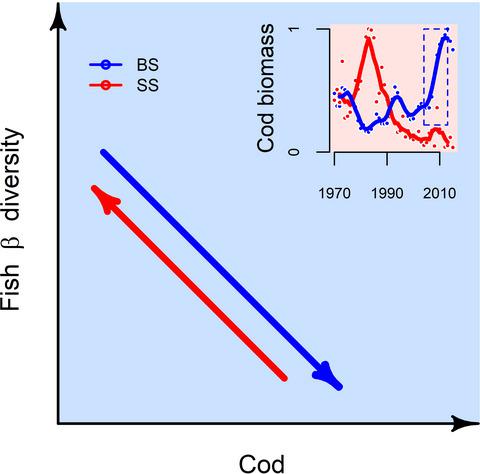当前位置:
X-MOL 学术
›
Glob. Change Biol.
›
论文详情
Our official English website, www.x-mol.net, welcomes your feedback! (Note: you will need to create a separate account there.)
The rise of a marine generalist predator and the fall of beta diversity.
Global Change Biology ( IF 11.6 ) Pub Date : 2020-03-17 , DOI: 10.1111/gcb.15027 Kari E Ellingsen 1 , Nigel G Yoccoz 2 , Torkild Tveraa 1 , Kenneth T Frank 3 , Edda Johannesen 4 , Marti J Anderson 5 , Andrey V Dolgov 6 , Nancy L Shackell 3
Global Change Biology ( IF 11.6 ) Pub Date : 2020-03-17 , DOI: 10.1111/gcb.15027 Kari E Ellingsen 1 , Nigel G Yoccoz 2 , Torkild Tveraa 1 , Kenneth T Frank 3 , Edda Johannesen 4 , Marti J Anderson 5 , Andrey V Dolgov 6 , Nancy L Shackell 3
Affiliation

|
Determining the importance of physical and biological drivers in shaping biodiversity in diverse ecosystems remains a global challenge. Advancements have been made towards this end in large marine ecosystems with several studies suggesting environmental forcing as the primary driver. However, both empirical and theoretical studies point to additional drivers of changes in diversity involving trophic interactions and, in particular, predation. Moreover, a more integrated but less common approach to the assessment of biodiversity changes involves analyses of spatial β diversity, whereas most studies to date assess only changes in species richness (α diversity). Recent research has established that when cod, a dominant generalist predator, was overfished and collapsed in a northwest Atlantic food web, spatial β diversity increased; that is, the spatial structure of the fish assemblage became increasingly heterogeneous. If cod were to recover, would this situation be reversible, given the inherent complexity and non‐linear dynamics that typify such systems? A dramatic increase of cod in an ecologically similar large marine ecosystem may provide an answer. Here we show that spatial β diversity of fish assemblages in the Barents Sea decreased with increasing cod abundance, while decadal scale changes in temperature did not play a significant role. These findings indicate a reversibility of the fish assemblage structure in response to changing levels of an apex predator and highlight the frequently overlooked importance of trophic interactions in determining large‐scale biodiversity patterns. As increased cod abundance was largely driven by changes in fisheries management, our study also shows that management policies and practices, particularly those involving apex predators, can have a strong effect in shaping spatial diversity patterns, and one should not restrict the focus to effects of climate change alone.
中文翻译:

海洋多面手捕食者的兴起和beta多样性的下降。
确定物理和生物驱动因素在塑造多样化生态系统中的生物多样性方面的重要性仍然是一项全球挑战。为此,大型海洋生态系统已取得了进展,多项研究表明环境强迫是主要驱动因素。但是,无论是经验研究还是理论研究都指出了涉及营养相互作用(尤其是捕食)的多样性变化的其他驱动因素。此外,评估生物多样性变化的更综合但较不普遍的方法涉及对空间β多样性的分析,而迄今为止,大多数研究仅评估物种丰富度(α多样性)的变化。最近的研究已经确定,当鳕鱼(一种占优势的捕食者)在西北大西洋的食物网中被过度捕捞和倒塌时,其空间β多样性会增加;那是,鱼群的空间结构变得越来越异质。如果鳕鱼要恢复,鉴于这种系统所固有的固有复杂性和非线性动力学,这种情况是否可以逆转?生态相似的大型海洋生态系统中鳕鱼数量的急剧增加可能提供了答案。在这里,我们显示,随着鳕鱼丰度的增加,巴伦支海鱼群的空间β多样性降低,而温度的年代际尺度变化没有显着作用。这些发现表明,鱼类的装配结构可逆性响应于尖角捕食者水平的变化,并突出了营养相互作用在确定大规模生物多样性模式中经常被忽视的重要性。由于鳕鱼数量的增加主要是由渔业管理的变化所驱动,
更新日期:2020-04-22
中文翻译:

海洋多面手捕食者的兴起和beta多样性的下降。
确定物理和生物驱动因素在塑造多样化生态系统中的生物多样性方面的重要性仍然是一项全球挑战。为此,大型海洋生态系统已取得了进展,多项研究表明环境强迫是主要驱动因素。但是,无论是经验研究还是理论研究都指出了涉及营养相互作用(尤其是捕食)的多样性变化的其他驱动因素。此外,评估生物多样性变化的更综合但较不普遍的方法涉及对空间β多样性的分析,而迄今为止,大多数研究仅评估物种丰富度(α多样性)的变化。最近的研究已经确定,当鳕鱼(一种占优势的捕食者)在西北大西洋的食物网中被过度捕捞和倒塌时,其空间β多样性会增加;那是,鱼群的空间结构变得越来越异质。如果鳕鱼要恢复,鉴于这种系统所固有的固有复杂性和非线性动力学,这种情况是否可以逆转?生态相似的大型海洋生态系统中鳕鱼数量的急剧增加可能提供了答案。在这里,我们显示,随着鳕鱼丰度的增加,巴伦支海鱼群的空间β多样性降低,而温度的年代际尺度变化没有显着作用。这些发现表明,鱼类的装配结构可逆性响应于尖角捕食者水平的变化,并突出了营养相互作用在确定大规模生物多样性模式中经常被忽视的重要性。由于鳕鱼数量的增加主要是由渔业管理的变化所驱动,



























 京公网安备 11010802027423号
京公网安备 11010802027423号